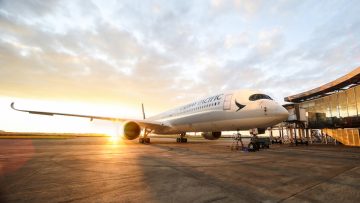
Dubai carrier Emirates has completed the ground engine testing for one of its GE90 engines on its Boeing 777-300ER using 100 per cent Sustainable Aviation Fuel (SAF).
The objective of the test was to demonstrate the capability of the GE90 engine to run on the specially blended SAF without affecting its performance, while requiring no modifications to the aircraft systems, or special maintenance procedures on the jet or the engine.
The ground test comes ahead of the airline’s planned first experimental test flight using 100 per cent SAF in one engine, due to take place this week.
The ground testing testing procedure involved running one engine on 100 per cent SAF and the other on conventional jet fuel to analyse the fuel system´s behaviour and performance under each fuel type, compare specific outputs of each engine, and ensure seamless operation of the aircraft’s engine and airframe fuel systems during the upcoming planned test flight.
The ground testing took place at the Emirates Engineering Centre in Dubai. The stationary operating testing began by running the Honeywell 331-500 auxiliary power unit (APU) on 100 per cent SAF. The APU was then put under full load with SAF to start the engines. The left engine was exercised through its full power range – utilising the same settings that will be used for the experimental flight. This included idle, ‘take-off’ and ‘climb settings’ at full flight profile durations, running at maximum speed and intensity. Engines were then run at ‘cruise’ settings for 15 minutes.
The latest tests follow an MoU signed between Emirates, GE Aerospace and Boeing at the Dubai Airshow 2021 to develop a programme to conduct a test flight using 100 per cent SAF.
Emirates said that it has been working with GE Aerospace, Boeing, Honeywell, Neste and Virent, a subsidiary of Marathon Petroleum Corp, throughout last year on SAF fuel blend testing.
Together, they have reportedly developed a blend with the same qualities and performance characteristics of conventional jet fuel. The results of the collaboration will provide additional data and research around synthetic fuel blend components and biofuels, supporting standardisation and future approval of 100 per cent drop-in SAF. Following the successful trial on one engine, Emirates said that it will continue to develop these initiatives with the engine airframe manufacturers as well as SAF providers with the aim of certifying these blends for commercial use. Currently, SAF is approved for use in blends of up to 50 per cent with conventional jet fuel.
Emirates’ first flight powered by SAF blended with jet fuel was conducted back in 2017, operating from Chicago O’Hare airport on a Boeing 777. Its first A380 flight powered by SAF took place in December 2020, and uplifted 32 tonnes of SAF for its flights from Stockholm earlier that year, with the support of Swedavia’s Biofuel Incentive Programme. Flights from Oslo have also begun operating on SAF.
Emirates is on the Steering Committee of the World Economic Forum’s (WEF) Clean Skies for Tomorrow initiative, which seeks to promote SAF deployment worldwide. The airline has also contributed to the UAE government’s work on a SAF roadmap and the WEF-supported Power-to-Liquids Roadmap for the UAE. SAF reduces carbon emissions over the fuel’s life cycle by up to 80 per cent.












